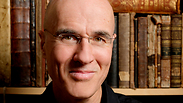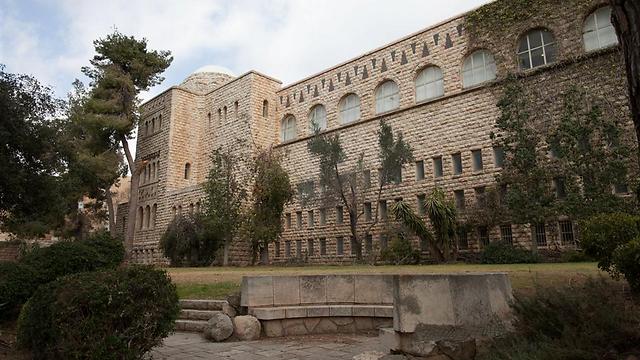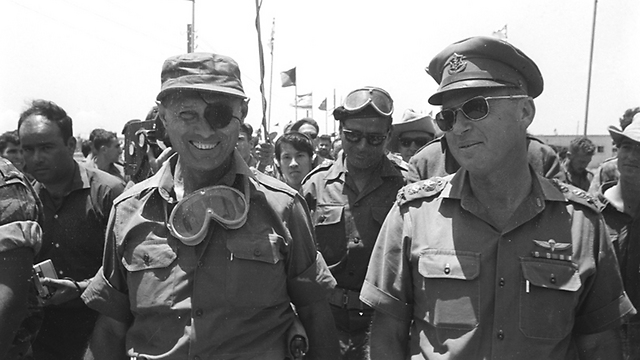Let me start with the bottom line: In the past, I studied at the Hebrew University in Jerusalem, and I currently teach there, and in my opinion, it is appropriate that at its graduation ceremonies, "Hatikvah" be sung.
No one in his right mind would insist that somebody who isn't Jewish enthusiastically sing with enthusiasm "a Jewish soul yearns." There is a limit. But as for standing up: that's appropriate. That's my opinion, anyway. It's a matter of basic human dignity.
The first ceremony took place 99 years ago, on July 24, 1918. That same day, in the presence of Gen. Allenby, Chaim Weizmann, Rabbi Avraham Yitzhak Hacohen Kook, the Jerusalem Mufti Kamil al-Husayni and many others, the cornerstones were laid for the establishment of the Hebrew University of Jerusalem.
'Hatikvah' lyrics
As long as in the heart, within,
A Jewish soul still yearns,
And onward, towards the ends of the east,
An eye still gazes toward Zion;
Our hope is not yet lost,
The hope of two thousand years,
To be a free people in our land,
The land of Zion and Jerusalem.
Forty-nine years passed. There were developments and wars. A state arose. Another war took place. Fifty years ago, immediately after the Six-Day War, in June 1967, IDF Chief of Staff Yitzhak Rabin stood in the same amphitheater on Mount Scopus.
Rabin said in that speech: "The warriors in the front lines witnessed not only the glory of victory but also its price—their comrades who fell beside them, bleeding. And I know that the terrible price paid by our enemies also touched the hearts of many of our men deeply. It may be that the Jewish people never learned, never accustomed themselves to experience the thrill of conquest and victory, and so we receive it with mixed feelings."
 Don't get me wrong. If you ask me if it's appropriate to sing "Hatikvah" at the university's graduation, then I think that it is. But the fact that the prime minister, the education minister, the leader of the Bayit Yehudi faction Shuli Mualem-Rafaeli, the justice minister, and many others are all tweeting and posting declarations that they are shocked that it might not be sung—is pathetic. It's really pathetic.
Don't get me wrong. If you ask me if it's appropriate to sing "Hatikvah" at the university's graduation, then I think that it is. But the fact that the prime minister, the education minister, the leader of the Bayit Yehudi faction Shuli Mualem-Rafaeli, the justice minister, and many others are all tweeting and posting declarations that they are shocked that it might not be sung—is pathetic. It's really pathetic.
And that, in my opinion, indicates a deep fear.
Erel Shalit has published a book called The Hero and His Shadow: Psychopolitical Aspects of Myth and Reality in Israel. In it, he analyzes our existential fears, those that lie beneath the image of the indomitable Israeli hero.
Erel Shalit has published a book called The Hero and His Shadow: Psychopolitical Aspects of Myth and Reality in Israel. In it, he analyzes our existential fears, those that lie beneath the image of the indomitable Israeli hero.
Every time I hear Israeli politicians talking about Israeli Arabs as a dangerous, ungrateful fifth column and not as a group of citizens that is a national minority that is largely law-abiding and could be a bridge to peace, I get a little ashamed. It seems to me that after so many years, so many victories, and so many successes, we could begin to relax here in the Land of Israel.
 This isn't popular, but it needs be said: With all due respect to the army, the last time the IDF was called upon to fight opponents whose capabilities were close to its own was in 1973. For more than 40 years now, Israel has only been fighting enemies who have no chance of defeating it, and it is afraid of them and hates them as if they were the devil himself.
This isn't popular, but it needs be said: With all due respect to the army, the last time the IDF was called upon to fight opponents whose capabilities were close to its own was in 1973. For more than 40 years now, Israel has only been fighting enemies who have no chance of defeating it, and it is afraid of them and hates them as if they were the devil himself.
Because with all due respect to Hezbollah missiles, to the slaughterers of ISIS, to Hamas knifemen and to the northern branch of the Islamic Movement, it has been many years now that Israel has had no serious enemy endangering its existence. There was a chance that the Iranians would become such an enemy, but it faded, or at least was postponed for several years.
 So why are these things not self-evident? Because of the tremendous power of fear and hatred and the ease with which they can be aroused in the public. I think that after a hundred years of Zionist success, we can begin to be a free people in our country—a people that is also free from fear.
So why are these things not self-evident? Because of the tremendous power of fear and hatred and the ease with which they can be aroused in the public. I think that after a hundred years of Zionist success, we can begin to be a free people in our country—a people that is also free from fear.
Professor Yoram Yovell is a psychiatrist, brain researcher and psychoanalyst who teaches at the Hebrew University's School of Medicine and at Hadassah Ein-Karem Hospital in Jerusalem. He can be reached at Office@yovell.co.il.



Comments
Post a Comment